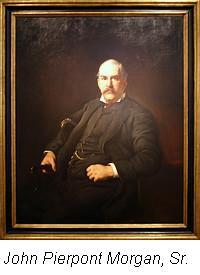Too Big to Fail Fail
by Craig Jennings, 8/31/2009
 Since the phrase "too big too fail" entered the fiscal lexicon last year, I've been really curious as to why the anti-trust divisions at the Federal Trade Commission or Department of Justice have not taken a keen interest in the nation's banking system. And much to my chagrin, Congress has yet to hold a hearing entitled "Busting the Banking Trust," or something along those lines*.
Since the phrase "too big too fail" entered the fiscal lexicon last year, I've been really curious as to why the anti-trust divisions at the Federal Trade Commission or Department of Justice have not taken a keen interest in the nation's banking system. And much to my chagrin, Congress has yet to hold a hearing entitled "Busting the Banking Trust," or something along those lines*.
And now I'm dismayed to read in the WaPo on Friday, that too-big-too-fail banks are getting even bigger.
J.P. Morgan Chase, an amalgam of some of Wall Street's most storied institutions, now holds more than $1 of every $10 on deposit in this country. So does Bank of America, scarred by its acquisition of Merrill Lynch and partly government-owned as a result of the crisis, as does Wells Fargo, the biggest West Coast bank. Those three banks, plus government-rescued and -owned Citigroup, now issue one of every two mortgages and about two of every three credit cards, federal data show.
It was federal banking regulators that "pushed failing mortgage lenders and Wall Street firms into the arms of even bigger banks and handed out billions of dollars to ensure that the deals would go through," ostensibly because those smaller banks were too big too fail. Even more worrisome, rules put in place to prevent this sort of conglomeration were waived.
J.P. Morgan Chase, Bank of America and Wells Fargo were each allowed to hold more than 10 percent of the nation's deposits despite a rule barring such a practice. In several metropolitan regions, these banks were permitted to take market share beyond what the Department of Justice's antitrust guidelines typically allow, Federal Reserve documents show.And in addition to failing to bring banking institutions down to sizes that don't necessitate multi-trillion dollar bailouts, banking regulators actually made the situation much worse by expanding the market power (i.e. monopoly power) of the too-bigger-to-fail, government-subsidized survivors. When firms control a certain proportion of the market and are not threatened by competition, they tend to screw consumers and squeeze the remaining competition -- and that's exactly what we're seeing now.
In the last quarter, the top four banks raised fees related to deposits by an average of 8 percent, according to research from the Federal Reserve Bank of Dallas. Striving to stay competitive, smaller banks lowered their fees by an average of 12 percent.
Maybe Bernanke, Geithner, Paulson, et al. were right to conjoin these institutions to avoid an apocalyptic collapse of the economy, but had the regulators and trust watchers not been asleep at the switch for the past decade, we wouldn't be where we are now. It's extremely troubling that there's been little effort to move to a resolution of the root cause of the banking crisis -- that some banks control more of the financial services market than is economically viable.
*In July, the House Financial Services Committee held a hearing entitled "Systemic Risk: Are Some Institutions Too Big to Fail and If So, What Should We Do About It?" That hearing, however, was focused solely on risks too-big-too-fail banks pose to the financial system and not on those banks' market power.
Image by Flickr user cliff1066 used under a Creative Commons license.



